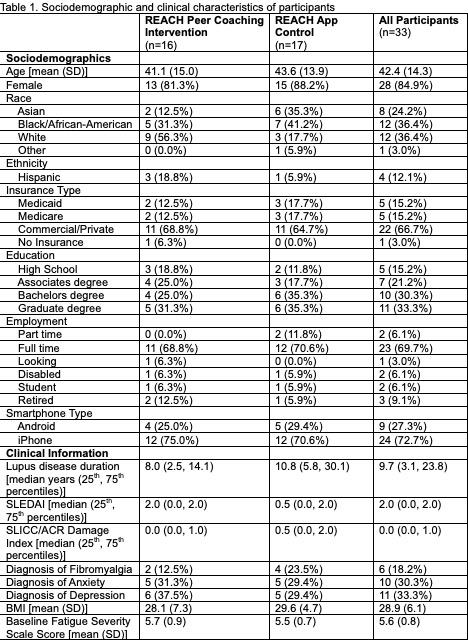Session Information
Date: Tuesday, October 28, 2025
Title: (2377–2436) Systemic Lupus Erythematosus – Diagnosis, Manifestations, & Outcomes Poster III
Session Type: Poster Session C
Session Time: 10:30AM-12:30PM
Background/Purpose: Fatigue is a highly prevalent and debilitating symptom affecting up to 90% of individuals living with systemic lupus erythematosus (SLE). Despite its significant impact, fatigue remains difficult to treat due to its complex, multifactorial origin, including behavioral and psychosocial factors. While physical activity interventions have shown promise in reducing SLE-related fatigue, they often fail to address these multiple factors and have been limited by their in-person format. The aim of this study is to evaluate the feasibility and preliminary efficacy of the Restore Energy, Activity Can Help (REACH) mobile health (mHealth)-enabled peer coaching intervention for fatigue in SLE.
Methods: Individuals meeting 2019 ACR SLE classification criteria were enrolled in this open-label pilot randomized controlled trial. Participants were randomized to the REACH mHealth-enabled peer coaching intervention or the REACH mHealth application (app)-only control arm. Participants in the intervention arm were paired with trained coaches with lived SLE experience who supported participants through a 12-week structured program promoting physical activity facilitated by the REACH app. Program feasibility was assessed via enrollment and adherence rates, and acceptability was evaluated with participant net promoter scores. Preliminary efficacy of the intervention was examined by comparing Fatigue Severity Scale (FSS) scores between arms at 12 weeks using ANCOVA. All participants were interviewed for feedback at program completion.
Results: Thirty-three of 43 eligible individuals screened enrolled (76.7% enrollment rate), with a mean baseline FSS score of 5.6 (SD 0.8) (Table 1). In the 29 participants in whom data collection has been completed to date, 26 finished the program (completion rate 89.7%) (Table 2). Program adherence rates were high, especially in the peer coaching arm, in which mean completion rates of educational modules, weekly check-ins and patient-reported outcome surveys were over 90% (Table 2). At 12 weeks, mean FSS scores were 0.8 (95% CI 0.2 to 1.5) lower in the coaching arm than the app-only arm, and a clinically meaningful improvement of ³ 0.6 was achieved in 75% of participants in the coaching arm vs. 40% in the app arm. Likelihood to recommend the program and its individual components were higher in the coaching arm than the app-only arm (Table 2). Participants in both arms shared that the program was impactful, citing improvements in self-efficacy and increased self-awareness and self-regulation facilitated by the accountability and motivation provided by both the peer coach and the REACH app. (Table 3).
Conclusion: The REACH peer coaching intervention was feasible and demonstrated promising preliminary efficacy for reducing fatigue in SLE. Participants in the coaching arm showed greater improvement in fatigue, with a higher proportion achieving a clinically meaningful benefit than in the app-only arm. Participant engagement and satisfaction were high. These findings support the potential of mHealth-enabled peer coaching to address behavioral and psychosocial drivers of fatigue in SLE and warrant further evaluation in larger trials.
 Table 1. Sociodemographic and clinical characteristics of participants
Table 1. Sociodemographic and clinical characteristics of participants
.jpg) Table 2. REACH program adherence rates and acceptability ratings
Table 2. REACH program adherence rates and acceptability ratings
.jpg) Table 3. Impact of REACH program: thematic analysis of participant interview feedback
Table 3. Impact of REACH program: thematic analysis of participant interview feedback
To cite this abstract in AMA style:
Kasturi S, Morrissey E, Deck A, Gulati N, Gilbard Z, Singh K, Gore-Massy M, Chiu F, Calvache P, Rose-Smith J, Ogura A, Ogura Dantas L, Machua W, Nguyen J, Mandl L, Tighiouart H, Trinquart L, Navarro-Millan I, Folta S. mHealth-enabled Peer Coaching for Fatigue in Systemic Lupus Erythematosus (SLE): Preliminary Results from the Restore Energy, Activity Can Help (REACH) Pilot Randomized Controlled Trial [abstract]. Arthritis Rheumatol. 2025; 77 (suppl 9). https://acrabstracts.org/abstract/mhealth-enabled-peer-coaching-for-fatigue-in-systemic-lupus-erythematosus-sle-preliminary-results-from-the-restore-energy-activity-can-help-reach-pilot-randomized-controlled-trial/. Accessed .« Back to ACR Convergence 2025
ACR Meeting Abstracts - https://acrabstracts.org/abstract/mhealth-enabled-peer-coaching-for-fatigue-in-systemic-lupus-erythematosus-sle-preliminary-results-from-the-restore-energy-activity-can-help-reach-pilot-randomized-controlled-trial/
